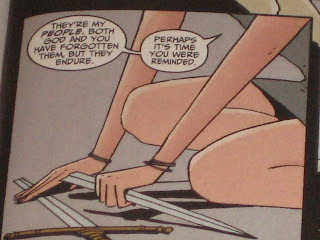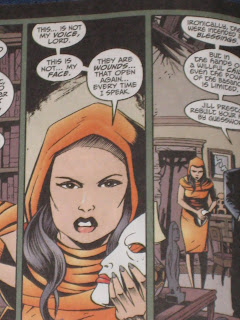
Changing Planes is actually a bundle of short stories about switching planes or dimensions while whiling the time away at those miserable things called air ports. Though there isn't a lot gadgetry or cyborgs, I would consider Changing Planes scientific if only because it asks and obliquely answers various "what if" questions. Since the narrator is a native of Earth's plane (or so it's implied), her reactions toward the society, culture, and history of the planes she visits are described in detail, fulfilling Asimov's requirement and, since it is mostly focuses on the people, it also provides ample opportunity for exploration of the soul.
A major theme I noticed was that of exploitation, whether it was citizens of a plane doing it to other citizens of the same plane, or evil Corporate earthlings taking over someone else's Islands and turning them into a capitalistic, 365 day a year, holiday theme parks (or something similar). Sometimes, though, the question was poised about whether it was good that other cultures should ignore the visitors and the culture they had to offer.
Anyway, here are my thoughts on some of the particular stories:
Porridge on IslacA plane where experimentation with genetics went out of control. People are sterilized, some can no longer give birth because of the ban. A woman who is 4% maize, named Ai Li A Le, had to give up her own daughter because of the experimentation:
My daughter lives in the North Sea. On raw fish. She's very beautiful. Dark and silky and beautiful. But -- I had to take her to the seacoast when she was two years old. I had to put her in that cold water, those big waves. I had to let her swim away, let her go be what she is. But she is human too! She is, she is human too!"
She was crying, and so was I.
I think so much is said in this simple quote. Perhaps her daughter is a selkie, perhaps not. But all children must grow up. All children must find their own way, their own pond, and be who they are. But, despite whatever choices we make in life, we are still human.
I think sometimes, underneath dogma and opinions and reason, we forget that.
The Silence of the AsonuPeople who live with animals value the charm of muteness. It can be a real pleasure to know when the cat walks into the room that he won't mention any of your shortcomings, or that you can tell your grievances to your dog without his repeating them to the people who caused them.
I think in this very Sound Driven world, silence is underrated. I think in C.S Lewis's
The Screwtape Letters that the demon had something to say about noise. I don't remember because it was so long ago, but I think the idea was to make it so noisy that one literally could not hear one's self think. The noise would assault the senses, sound would barrage the soul -- all the while making it impossible to sit down and simply
think properly about something.
Those who can't talk, and those who can talk but don't, have the great advantage over the rest of us in that they never say anything stupid. This may be why we are convinced that if they spoke they would have something wise to say.
This is why I like to keep my mouth shut in college, blogs (comments, not entries obviously), and the like.
However, the minute this story became interesting to me was when Le Guin wrote,
Since the Asonu don't talk, do they, in fact, listen?
A fascinating question, which wasn't really pursued in the narrative (at least, I didn't get that impression).
The narrative went on to say how people would follow certain members of the Asonu, writing down the few words they spoke, in an attempt to glean the meaning of their Hidden Wisdom. The short tale culminates in the kidnapping of a young child by a man who wished to teach her how to talk -- in other words, he hoped that by changing her environment she would continue to speak and therefore share with him the Wisdom of the Asonu.
For a year or more she had been whipped and beaten regularly "to teach her to talk," her captor explained, "because she's stubborn." She was dumb, cowering, undernourished, and brutalized.
When will people stop attempting to change other individuals to conform to their own ideas or standards? It is disgusting.
So. Can people really listen unless they themselves talk?
Talking, for me, is one way to be intimate with Ken (another way is cuddling). So I guess, in a way, talking is like sex (for me). It takes two to Tango, and it takes two to have a conversation. Can a conversation be had when one side ceaselessly listens? I wouldn't want that. As a writer, I love sharing experiences. I love having people respond to me -- it is a sharing of ideas. Like Water Brothers, I like to have Word Siblings.
Of course, all that rambling above misses the point. Perhaps a person can listen forever unless busy with their own thoughts, but I, personally, would find it unfullfilling.
Feeling at Home with the HennebetThis one was completely...serene and slightly
Strawberry Fields Forever.
Remember how Asimov said Science Fiction was the reaction to technology, and I thought it could also include the culture that resulted from technology/alien races/whatever?
Well this chapter here of
Changing Planes was a perfect example of that.
At first, the narrator finds that the folks of Hennebet are very similar to her -- but the longer she stays, the more she realizes how completely different they are.
They were well-tempered. They were good-tempered. It was not a virtue, an ethical triumph. They simply were good-natured people. Very different from me.
The narrative then meandered towards self identity -- something that I wasn't expecting.
If for one moment of your whole life you know that you are, then that's your life, that moment, that's unnua [Hennebet word for "universe"], that's all...when you get old, you know, you keep being here instead of there, everything is here.
Thou art god, perhaps?
...[I] brought up the word citizen on my translatomat. It said that the Hennebet word for citizen was person.
Citizens of the universe, each and every one of us?
Perhaps that is what we become when we cease drifting, always trying to be somewhere else or over there as we attempt to understand ourselves and become
here?
As I said, fascinating story, and I'm not really sure I understood it all.
Season of the AnsaracThe Ansarac: a bird like people who migrate -- who live two kinds of lives.
When the Bayderac came to our plane, they told us our Way was mere instinct and that we lived like animals. We were ashamed.
When the Ansarac protested, the Bayderac said:
'All that will change. You will see. You cannot reason correctly. It is merely an effect of your hormones, your genetic programming, which we will correct. Then you will be free of your irrational and useless behaviour patterns.'
"We answered, 'But will we be free of your irrational and useless behaviour patterns?"
I believe it speaks for itself.
Social Dreaming of the FrinThe Frin: people who share each other's dreams.
"The purpose of our dreams," says the philosopher Sorrdja of Farfrit, a strong dreamer of the ancient Deyu Retreat, "is to enlarge our souls by letting us imagine all that can be imagined: to release us from the tyranny and bigotry of the individual self by letting us feel the fears, desires, and delights of every mind in every living body near us."
A few blogs back I said that Science Fiction was very heavy on the theme of Individuality. Here, Le Guin writes of the "bigotry of the individual", which is a very unique aspect of individuality.
Sometimes, I think, people can be so caught up in themselves, that they don't take time to consider someone else's point of view. That is very dangerous, I think.
And dreams are such funny thing -- like the core bits of the soul popping to the surface for however brief.
What an intimate thing, to share dreams -- or nightmares, even. Hmm.
For them, dream is a communion of all the sentient creatures in the world. It puts the notion of self deeply into question. I can imagine only that for them to fall asleep is to abandon the self utterly, to enter or reenter the limitless community of being, almost as death is for us.
It's like the Borg, only on a parallel universe. And not for the rest of your life.




























